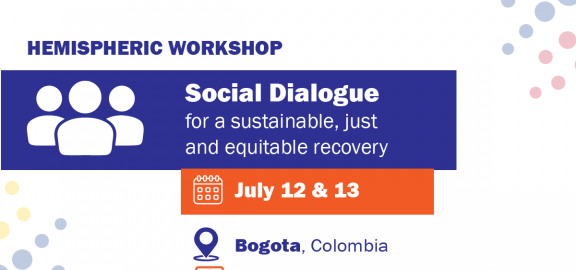Hemispheric Workshop on Social Dialogue
The Workshop “Social Dialogue for a sustainable, just and equitable recovery” gathered representatives from Ministries of Labor, representatives of workers and employers -through COSATE and CEATAL- and international organizations to exchange and analyze experiences on social dialogue, per the objectives set forth below.
This is an activity of the Inter-American Network for Labor Administration (RIAL), hosted by the Ministry of Labor of Colombia, and is a part of the Draft Work Plan 2022-2024 of the IACML.
General objective:
- Strengthen the human and institutional capacities of the Ministries of Labor and social actors to promote, consolidate and achieve more agreements through institutionalized national social dialogue mechanisms.
Specific objectives:
- Exchange and analyze experiences on the functioning of social dialogue instances during the pandemic, especially those where responses, solutions, and policies to address the health and economic crisis were agreed upon in a tripartite way.
- Identify elements or characteristics within the social dialogue instances that allow the achievement of agreements.
- Prepare recommendations to strengthen institutionalized national social dialogue instances.
The Inter-American Network for Labor Administration (RIAL) in partnership with the Ministry of Labor of Colombia
| Attachment | Size |
|---|---|
| 254.08 KB | |
| 404.96 KB | |
| 398.99 KB | |
| 440.39 KB |
Links to recordings
Morning, July 12 Passcode: Z3?xdXdU
Afternoon, July 12 Passcode: Z3?xdXdU
Morning, July 13 Passcode: v&9qeQ38
Panel 1 - Social dialogue in response to the pandemic: How did social dialogue instances work in the immediate response to the pandemic and during 2020 and 2021?
The first panel had introductory presentations from Jamaica, Argentina and Barbados, as well as an open space for dialogue, and had the objetive of answering to the following guiding questions:
- What instances of tripartite social dialogue were activated or created to give immediate response to the crisis generated by the pandemic in 2020? What were the successes and challenges of these mechanisms?
- Do you consider that the immediate response to the health emergency strengthened or weakened institutionalized social dialogue in your country? Why?
- Did reaching responses through tripartite consultations, favored its application and/or contributed to a better environment for labor relations during the pandemic?
Panel 2 - Social dialogue in the recovery: How to strengthen institutionalized social dialogue in the region?
The second panel had introductory presentations from Colombia, Paraguay, Peru and Panama, and had the objetive of answering to the following guiding questions:
- Based on your experience, particularly in the recent period, which are the main elements or characteristics that social dialogue mechanisms should have to reach tripartite agreements?
- What recommendations does your institution have to strengthen institutionalized social dialogue in your country?
- ¿What recommendations does your institution have to further develop and ensure the full exercise of freedom of association and collective bargaining?




